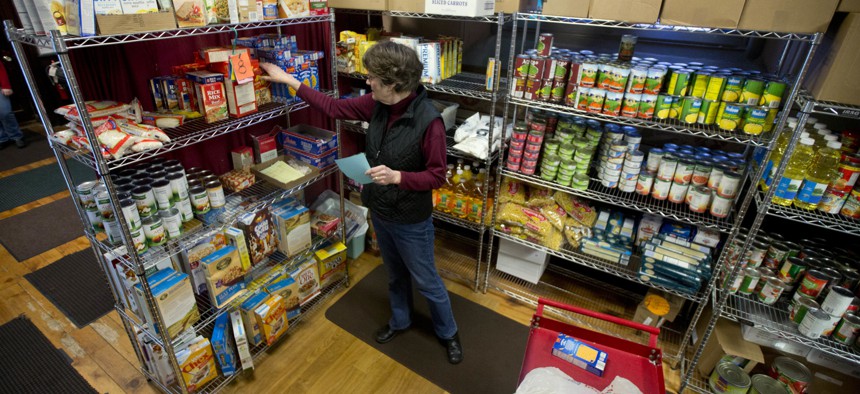Connecting state and local government leaders
Recent changes pushed by the Trump administration are expected to result in about 10 percent of recipients losing benefits. Another 500,000 children would lose access to free or reduced-price meals at school.
The Trump administration has proposed three changes to food stamp eligibility in the last year that are expected to eliminate benefits for around 4 million people, or approximately 10 percent of those currently enrolled in the program.
The proposals put forth by the U.S. Department of Agriculture—one introduced last week—would by and large reduce states’ autonomy in administering the Supplemental Nutrition Assistance Program, more commonly known as food stamps. The three separate proposals would create more stringent work requirements for the program, do away with automatic enrollments for those on welfare, and alter the way utility costs are factored into the benefit analysis.
Administration officials have argued, in part, that states were abusing the flexibility in the system. For example, U.S. Secretary of Agriculture Sonny Perdue over the summer said a "loophole" had been used "to effectively bypass important eligibility guidelines."
Jane Adams, a senior policy analyst with Bread for the World, a Christian advocacy group, argued that states need to be flexible to respond to local issues and nuances in the economy.
“States know their people the best and their costs and expenses the best ant that why it’s important for them to be administrating SNAP,” Adams said. “Believe it or not, poverty does not look the same everywhere.”
Others worry that the changes, if implemented, will harm millions of low-income Americans. Approximately 40 million low-income people received food stamps in 2018.
“If the three proposals become final and are implemented, millions of SNAP participants will have their benefits reduced or cut altogether—particularly seniors, people with disabilities, and working families—and 500,000 children will lose access to school meals,” said Kate Leone, the chief government relations officer for Feeding America, a nationwide network of food banks and pantries.
Each of the proposals would affect SNAP recipients and states administering the program in different ways.
The most recent proposal, released on Thursday, would change the way recipients’ income, as well as housing and utility expenses, are used to calculate benefits. About 8,000 households would lose SNAP benefits entirely and 19 percent of recipients would see a decrease in monthly benefits.
States have been providing average cost estimates for utilities like heating and cooling bills that are used to determine the amount of food stamps a household receives. Under the proposed rule, the federal government would set its own state allowances, allowing more standardization. Currently, allowances vary from $278 to $826 between states. A USDA spokesman said that “modernizing the SNAP program by standardizing standard utility allowances will improve program integrity and provide equity for SNAP recipients, while still allowing states to continue to run a streamlined program.”
Advocacy groups that battle poverty say this type of variation is helpful for states where utility costs are high, such as in colder northern climates.
The proposal would reduce spending by $4.5 billion over five years and 29 states are expected to see a net loss of SNAP benefits. But it would also for the first time allow internet utility costs to be included in calculations, potentially increasing benefits to some families.
States would still have the option of documenting actual utility costs for each recipient, though Adams said the task would be cumbersome and is precisely the reason why the standard allowances were created.
The USDA is accepting comments on the proposed rule through December 2.
Another proposal, introduced earlier this year, would do away with “broad-based categorical eligibility,” or states’ ability to set their own income limits and asset requirements for SNAP recipients.
To qualify for SNAP, individuals must earn less than 130 percent of the federal poverty guidelines, or approximately $2,252 a month for a family of three. But 29 states have implemented their own eligibility guidelines, which allow for benefits to be extended to people with incomes as high as 200 percent of the poverty line.
By doing away with the eligibility buffer that 29 states have implemented, an estimated 3 million SNAP recipients would lose benefits and 500,000 children would lose out on free and reduced lunch in school. A recent study found food stamp recipients in the Pacific Northwest, Midwest and Texas would be hit hardest the new eligibility requirements, while also finding that more people—up to 3.6 million—could be affected by the changes.
Perdue this summer said the proposal "will save money and preserve the integrity of the program," while emphasizing that “SNAP should be a temporary safety net.”
Currently families that qualify for Temporary Assistance for Needy Families programs (which can include cash benefits, childcare assistance and job training) are also automatically enrolled in SNAP. Doing away with the automatic enrollment places more of a financial and administrative burden on states to vet and enroll recipients.
“It’s going to cost a lot more for state agencies because they do not have a streamlined way to complete applications,” Adams said.
Another proposal would impose more stringent work requirements on SNAP recipients, leading to an estimated 750,000 people losing benefits. Perdue has said the move is necessary to “encourage participants to take proactive steps toward self-sufficiency.”
The comment period for both the categorical eligibility and work requirement rules have both closed and garnered fierce opposition from Congressional Democrats, city mayors, and advocacy groups. More than 100,000 comments were submitted in response to both the work requirement rule and the categorical eligibility rule.
A USDA spokesman said the comments submitted would be reviewed as the department prepares to move forward with the final rules.
Andrea Noble is a staff correspondent with Route Fifty.

NEXT STORY: Trying to End the Dangerous Practice of Late-Night Jail Releases



